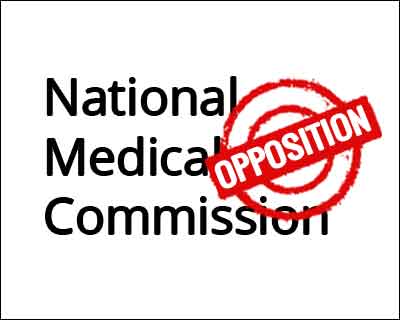- Home
- Medical news & Guidelines
- Anesthesiology
- Cardiology and CTVS
- Critical Care
- Dentistry
- Dermatology
- Diabetes and Endocrinology
- ENT
- Gastroenterology
- Medicine
- Nephrology
- Neurology
- Obstretics-Gynaecology
- Oncology
- Ophthalmology
- Orthopaedics
- Pediatrics-Neonatology
- Psychiatry
- Pulmonology
- Radiology
- Surgery
- Urology
- Laboratory Medicine
- Diet
- Nursing
- Paramedical
- Physiotherapy
- Health news
- Fact Check
- Bone Health Fact Check
- Brain Health Fact Check
- Cancer Related Fact Check
- Child Care Fact Check
- Dental and oral health fact check
- Diabetes and metabolic health fact check
- Diet and Nutrition Fact Check
- Eye and ENT Care Fact Check
- Fitness fact check
- Gut health fact check
- Heart health fact check
- Kidney health fact check
- Medical education fact check
- Men's health fact check
- Respiratory fact check
- Skin and hair care fact check
- Vaccine and Immunization fact check
- Women's health fact check
- AYUSH
- State News
- Andaman and Nicobar Islands
- Andhra Pradesh
- Arunachal Pradesh
- Assam
- Bihar
- Chandigarh
- Chattisgarh
- Dadra and Nagar Haveli
- Daman and Diu
- Delhi
- Goa
- Gujarat
- Haryana
- Himachal Pradesh
- Jammu & Kashmir
- Jharkhand
- Karnataka
- Kerala
- Ladakh
- Lakshadweep
- Madhya Pradesh
- Maharashtra
- Manipur
- Meghalaya
- Mizoram
- Nagaland
- Odisha
- Puducherry
- Punjab
- Rajasthan
- Sikkim
- Tamil Nadu
- Telangana
- Tripura
- Uttar Pradesh
- Uttrakhand
- West Bengal
- Medical Education
- Industry
NMC Bill, a major medical education reform- AHPI welcomes Bill

New Delhi: Association of Healthcare Providers (India), an assocation that represents the vast majority of healthcare providers in India has welcomed the National Medical Commission bill, calling it a major medical education reform.
Pointing out to the current situation in the healthcare sector has gone far beyond the point of incremental tweaking of the present system, Association of Healthcare Providers, India, (AHPI) termed the National Medical Commission Bill (NMC Bill) as a game changer reform initiative of transformational nature, as such the need of the hour, which needs to be implemented on a priority basis.
The National Medical Commission Bill has been referred to the Parliamentary Standing Committee in the Lok Sabha, which will give its recommendations on the 24th of January 2018.
The association in a recent press release pointed out that the Department -Related Parliamentary Standing Committee on Health & Family Welfare’ s report on the functioning of Medical Council of India which was presented to the RajyaSabha on 8 March, 2016, brought into sharp focus the abject failure of the Medical Council of India as the regulator of medical education in the country, resulting in innumerable challenges to the healthcare industry in India, shortage of quality doctors including specialists and super specialists in adequate numbers and of requisite quality; deficiency of teachers in medical colleges, disconnect between medical education system and healthcare system; geographical mal-distribution of medical colleges; poor regulation of Undergraduate (UG) and Postgraduate (PG) education, unaccountability &corrupt practices to name a few.
Despite having the most number of medical colleges in the world, and currently having approximately 10,22,859 doctors enrolled on the Indian Medical Register, India is way behind in achieving the targeted doctor-population ratio of 1:1000 as per WHO norms. Shortage of doctors, who are the most important component in the healthcare delivery system, has derailed both access to and quality of health care, especially to the vulnerable and poorer sections of the country. There is a huge geographical mal-distribution of medical colleges to the extent that 2/3 medical colleges are located in the regions representing 1/3 population in the country. There is a total disconnect between medical education system and requirement of healthcare delivery system in the country.
"Association of Healthcare Providers (India) welcomes the initiative of setting up of National Medical Commission. However, there are areas of concern in the draft bill that needs to be addressed if the objectives of having world-class regulatory framework are to be fulfilled." Said Dr Girdhar Gyani, President AHPI. He narrated the concerns as follows
- The proportion of elected representatives from medical fraternity in the proposed NMC 2017 is to the extent of 20% which is grossly inadequate and undermines the principles of democracy. Doctors are the primary stakeholders should, therefore, be adequately represented in the Commission.
- The founding principles of modern medicine are evidence-based and are rooted in standard treatment protocols, which have nothing in common with the traditional systems of medicine (AYUSH). Therefore, mixing up of these systems of medicine through bridge courses will in no way be appropriate. On the contrary, it will undermine patient safety and pave the way for promoting quackery. AHPI strongly recommends to the government to promote AYUSH and create or re-designate some of the PHCs as (rural as well as urban) AYUSH clinics and utilize services of AYUSH professional in such health centers.
- Following successful completion of the MBBS examination conducted under the direct supervision of NMC, enforcing another National Licentiate Examination on MBBS graduates is superfluous. However, those aspiring to go for post-graduate courses can be made to appear for National Licentiate Examination.


